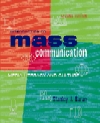Stanley J. Baran
| acquisitions editor | the person in charge of determining which books a publisher will publish
|
 |
 |
 |
| aliteracy | possessing the ability to read but being unwilling to do so
|
 |
 |
 |
| co-op placement | an advertisement paid for by publishers to online booksellers for their recommendations
|
 |
 |
 |
| cottage industry | an industry characterized by small operations closely identified with their personnel
|
 |
 |
 |
| d-book | a book downloaded in electronic form from the Internet to a computer or hand held device
|
 |
 |
 |
| dime novels | inexpensive late 19th- and early 20th-century books that concentrated on frontier and adventure stories; sometimes called pulp novels
|
 |
 |
 |
| e-book | digital book having the appearance of traditional books but with content that is digitally stored and accessed
|
 |
 |
 |
| e-publishing | the publication and distribution of books initially or exclusively online
|
 |
 |
 |
| instant books | books published very soon after some well-publicized public event
|
 |
 |
 |
| linotype | technology that allowed the mechanical rather than manual setting of print type
|
 |
 |
 |
| offset lithography | late 19th-century advance making possible printing from photographic plates rather than from metal casts
|
 |
 |
 |
| pulp novels | see dime novels
|
 |
 |
 |
| remainders | unsold copies of books returned to the publisher by bookstores to be sold at great discount
|
 |
 |
 |
| subsidiary rights | the sale of a book, its contents, even its characters to outside interests, such as filmmakers
|
 |
 |
 |
| trade books | hard- or softcover books including fiction and most nonfiction and cookbooks, biographies, art books, coffee-table books, and how-to books
|



 2002 McGraw-Hill Higher Education
2002 McGraw-Hill Higher Education

 2002 McGraw-Hill Higher Education
2002 McGraw-Hill Higher Education